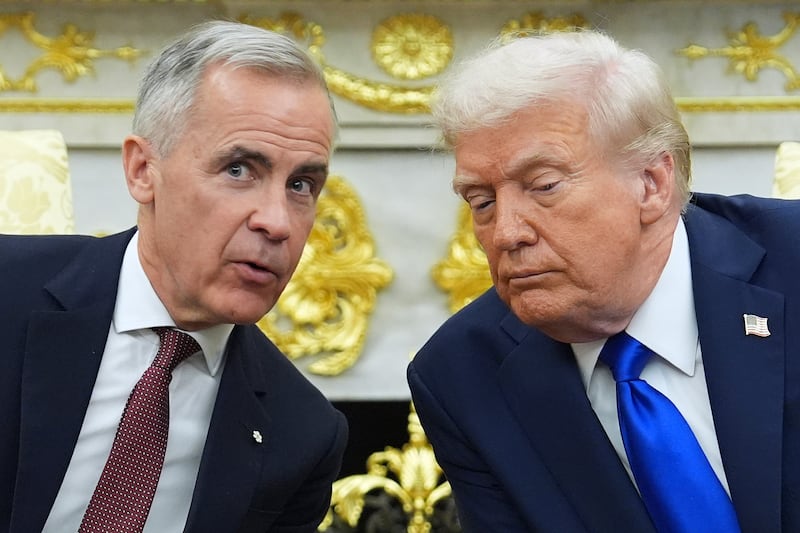President Donald Trump and Canadian Prime Minister Mark Carney appeared friendly during a press conference at the White House on Tuesday morning.
Although Trump made promises that Carney and his delegation would leave the White House following their work lunch “very happy,” no trade deal is in sight.
The U.S. imposes a 35% tariff rate on certain Canadian goods and 50% on Canadian steel.
“We have some natural conflict but we will probably work that out,” Trump said before adding, “we’ve had a very strong relationship.”
Trump said they planned to talk about tariffs and trade and the Israel-Hamas war in Gaza.
The Canadian prime minister’s first official visit to the White House happened on May 6, a week after he was sworn in as the head of his country.
“I said at the time you were — are — a transformation president," Carney said. He listed the many reasons that’s the case, including transforming the economy, shoring up support to Ukraine from NATO partners, negotiating peace between India and Pakistan and disabling Iran as a force of terror.
Trump added, “The merger of Canada and the United States” before saying it was a joke.
“That wasn’t where I was going, no,” Carney said with a laugh.
Tariff talks
Over the summer, the European Union and the United Kingdom managed to reach a deal with the Trump administration, locking in tariff rates of 15% and 10%, respectively.
But the two U.S. neighbors and longtime allies Canada and Mexico have yet to strike a deal — although most trade is still tariff-free under the U.S.-Canada-Mexico trade agreement.
Trump talked about the “complicated” trading relationship the U.S. and Canada share.
“I love Canada and the people of Canada, and Mark feels the same way about here,” Trump said. But the competition that emerges over various industries like cars or steel gets in the way.
“We don’t like to compete because we sort of hurt each other when we compete,” the U.S. president explained. “It’s a natural business conflict. Nothing wrong with it.”
Trump said other presidents didn’t see a problem with being generous toward Canada because “they weren’t business-oriented.”
The U.S. made compromises with Canada on steel and “we’ve come a long way,” the U.S. president said.
Could Canada go home with a deal in hand?
When asked to comment on the drop in Canadians willing to visit the U.S. amid the trade war and the ongoing joke about turning Canada into the 51st state, Trump said the relationship between the two countries “will get worked out.”
Carney clarified the relationship between the two countries as it stands.
“We are the second largest trading partner of the United States,” said Carney. He also noted Canada’s role as the largest foreign investor in the U.S., having spent “half a trillion dollars in the last five years alone (and) probably $8 trillion in the next five years if we get the agreement that we expect to get.”
“There are areas where we compete and it’s in those areas where we have to come to an agreement that works.”
A reporter asked if Carney will leave Washington, D.C. empty-handed. Trump said, “I think they’re going to walk away very happy.”
He later added that “the people of Canada will love us again.”
Trump and Carney on Middle East War
Carney credited Trump for making the prospect of peace possible in the Middle East following the horrific attacks on Oct. 7, 2023.
“Canada stands foursquare behind those efforts,” the prime minister added.
This visit is presented as a working one with a “focus on shared priorities in a new economic and security relationship between Canada and the U.S.”
The prime minister told the Canadian Parliament that Trump is a “modern man” and that the two “speak regularly” and “send each other text messages.”
Trump said his administration is “very close to making a deal ... that will bring peace to the Middle East."
Later in the day, Trump hosted former Hamas hostage Edan Alexander at the White House to mark the second anniversary of the Oct. 7 attack. His administration released a 20-point plan to end the war in Gaza.
Fentanyl crisis ‘not over’
The Trump White House imposed tariffs on Canada and Mexico to incentivize stopping the flow of illegal migration and drugs being smuggled into the U.S.
Trump said the fentanyl crisis and the flow of illicit drugs from Canada are “not over.”
“It’s never going to be over, frankly,” he said but added that “Canada’s worked hard.”
Carney also chimed in, “Any amount is too much, so we’ve gotten it down. It’s less than 1% but it’s still too much.”
Trump spoke highly of his Canadian counterpart during the 30-minute press briefing, calling Carney a “world class leader” and “a man that knows what he wants.”
As the final question, Trump was asked why he wasn’t willing to strike a deal with Carney even when he considered the Canadian prime minister “a great man.”
Trump jokingly responded, “I want to be a great man too.”


